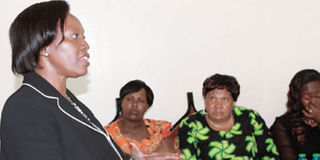Why record number of women aspirants has not rattled men

PHOTO | JAYNE NGARI Narc-Kenya leader and presidential aspirant Martha Karua addresses a forum for Nairobi County women aspirants where she urged them to go for all seats and support each other.
What you need to know:
- Only a small fraction are interested in competing for the constituency, governor and senate seats as majority of the female aspirants have opted to battle it out for the women’s county representative seats
- The latest effort to boost the number of women candidates is a publication by UN Women and the Centre for Multiparty Democracy (CMD) to help the aspirants participate in the polls
- Addressing the Tuesday launch of Women Candidates in Kenya training manual, UN Women’s country director Zebib Kavuma, Gender PS Franklin Esipila and secretary for children’s affairs Prof Jacquline Oduol urged women to look beyond the reserved seats
The March 4 General Election has attracted the highest number of women ever in Kenya’s history, most of them encouraged by the provisions of the new Constitution.
But only a small fraction are interested in competing for the constituency, governor and senate seats as majority of the female aspirants have opted to battle it out for the women’s county representative seats.
A large number of women also want to contest the county assembly representative seats.
A look at a forum for women aspirants in Nairobi showed that of the 40 in attendance, only two are in the race for the National Assembly and another two for the Senate, while 19 are eyeing a women’s representative seat and 17 others seats in county assemblies.
Women’s movements and organisations have in the recent past intensified voter education and mobilisation campaigns to encourage women to contest all the elective seats.
Some of the organisations have been recruiting and identifying women whom they plan to support. They have been convening meetings for aspirants that are addressed by women leaders in politics, civil societies and by other professionals to encourage their counterparts to enter the male-dominated political arena.
The latest effort to boost the number of women candidates is a publication by UN Women and the Centre for Multiparty Democracy (CMD) to help the aspirants participate in the polls.
Although the women representatives will sit in the National Assembly as MPs, the leaders worry that it will be impossible to close the gender gap in the eleventh Parliament if the majority of women chose to seek seats reserved for them.
Addressing the Tuesday launch of Women Candidates in Kenya training manual, UN Women’s country director Zebib Kavuma, Gender PS Franklin Esipila and secretary for children’s affairs Prof Jacquline Oduol urged women to look beyond the reserved seats.
“You are going to step on each other,” said Mr Esipila. “Be courageous, go out there and fight for other top seats.”
Ms Kavuma said: “We cannot all vie for the same seat. Let us diversify. We need Kenyans to say that women have the right and capability to run for all seats.”
At another forum for aspirants in Nairobi recently, presidential hopeful Martha Karua asked women to cast their net wider, saying the majority were concentrating on the guaranteed seats and the county assembly seats. “We need more women for the parliamentary and gubernatorial positions,” she said.
The Narc-Kenya leader also asked women to stay united and respect each other even as they seek the various positions, noting that this would help more women to win seats overall.
“Where there is a woman, please favour her with votes,” she urged the aspirants. “We want each one of you to get ready for it. This isn’t a trial run. We must work together to create that miracle of our representation target come March 2013.”
The Gichugu MP also encouraged more women to seek seats in the National Assembly. But she also cautioned them about ensuring their personal security and advised them on political party choices.
Education minister Mutula Kilonzo and Nominated MP Sofia Abdi (ODM) say fear of violence, intimidation, harassment and electoral fraud forces women to shy away from competing with men.
“I do not really blame them for going that way. Political parties have not changed their intolerance, and women instinctively run away from violence and related problems,” Mr Kilonzo said. “When they stand as county representatives, they feel safer facing fellow women. A fellow woman will not organise violence against a counterpart.”
The minister insisted that Parliament should support the constitutional amendment he tabled in the House while in the Justice docket as the best way to achieve gender parity in the next Parliament. Ms Abdi, who is eyeing the Ijara parliamentary seat held by Defence minister Yusuf Haji, says community incitement by male rivals against women is also discouraging women from running for Parliament and governor.
“Some of these men are going round constituencies telling people that women are only supposed to run as county representatives. This is an issue that and has traumatised some potential aspirants,” said Ms Abdi.
Machakos county gubernatorial aspirant Wavinya Ndeti says women are having a rough time on the campaign trail.
“You need to be tough and fearless in this game. I have been abused and a subject of negative debates by some of my opponents who take the contest on a personal level,” she says.
Ms Ndeti says she has recordings of insults hurled at her and has vowed to hand them over to the Independent Electoral and Boundaries Commission for action.
Ms Ndeti, who recently managed to raise more than Sh20 million to boost her campaign, says some women’s families discourage them.
Aspiring Kilome MP Regina Ndambuki concurs, saying she has managed to go on with her quest for MP because of her understanding husband.
“One has to endure intimidations from the opposite sex. We go through these in our campaigns, and sometimes it pains but we just close our eyes and move on”, says Mrs Ndambuki.




